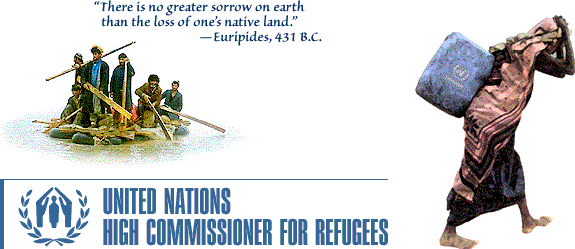| KOSOVO: GYPSIES – NO
PROTECTION, NO SOLUTION 23 Jul. 99 – UNHCR staff have convinced several hundred
Romanies to move to a refugee camp in Krusevac, where British soldiers set up 109 tents
and water supplies, reports Deutsche Presse-Agentur. Most of Kosovo's
Gypsies have lost everything in the last few months. The return of the Albanians has made
the Gypsies the newest victims of ethnic violence. Traditionally treated as outcasts,
Gypsies did some of the dirty work during the ravages of the Serbs. KFOR and international
aid agencies say there has been a rash of arson attacks on their homes. Gypsy refugee
camps in Kosovo's main towns are the result. Inmates tell tales of intimidation and
harassment by Albanians. The dangers were all too obvious at Krusevac. As the Gypsies
reached their tents, a small child was hit by a stone thrown by an Albanian. The Gypsies
turned around and threatened to leave the camp if the British soldiers did not provide
better security for them. A British officer said KFOR did not have the resources to
protect the camp. UNHCR also admitted it had no adequate solution yet. "This camp is
to offer them better conditions and win time for ourselves until we find a long-term
solution," said spokeswoman Paola Ghedini. [No peace for the Roma people of Kosovo
– www.dpa.com] KOSOVO:
LAWLESSNESS CONCERNS 23 Jul. 99 – The United Nations administration in Kosovo has
begun recruiting Kosovans for a new police force amid growing criticism that it is taking
too long to assume policing and judicial tasks from KFOR peacekeepers, reports the Financial
Times. The US military in particular has been sharp in its attacks on the UN for
delays, but the UN response is that member states have been slow to deploy the promised
contingents of more than 3,000 international police to Kosovo. Only some 150 have arrived.
Meanwhile there is mounting concern among humanitarian agencies about rising levels of
lawlessness, murder and violent crime in Kosovo. UNHCR says members of minority groups,
mainly Serbs and Gypsies, are being attacked, sometimes fatally, on a daily basis.
"One Serb on average is reportedly killed every night in Kosovo, and elderly Serbs
are regularly thrown out of their homes and must be given shelter," it said. Jonathan
Steele in the Guardian says western governments are paying lip service to the UN
while preferring, for publicity reasons, to give their money directly to projects in
Kosovo. Some agencies prefer reconstruction to relief. As a result, UNHCR's work is
starved of cash. AFP adds a diplomat yesterday said NATO intends to change its
functions from Kosovo refugee aid to protecting lines of communication. [UN starts to
recruit for police force – www.ft.com; Kosovo: from a
police state to a state with no police at all – www.newsunlimited.co.uk; NATO looking to reduce
Albania force to 2,500 troops: diplomat – www.afp.com]
KOSOVO: MITROVICA DEAL? 23 Jul. 99 – Tension is
dropping in Mitorvica where Serbs and ethnic Albanians look set to sign a deal tomorrow on
the free movement of people in the divided town, reports Liberation. Mitrovica has
witnesses a number of confrontations on the bridge that divides Serbs from Albanians.
French KFOR troops in charge of the area are requesting patience from ethnic Albanians
living in poor conditions just minutes from the homes they were expelled from. Some 2,000
families are rumoured to be waiting to go back. Under the agreement, UNHCR is to carry out
a more precise survey. But legal headaches loom as people will claim homes occupied by
others. [Mitrovica negotiations over bridge – www.liberation.fr]
BOSNIA: DAYTON 'FAILING' 23 Jul. 99 – The
implementation of the US-brokered peace agreement that ended the 1992-1995 Bosnian war has failed to a large extent, a Balkan
expert said yesterday, reports Reuters. Political analyst James Lyon of the
International Crisis Group, a think tank, said the only successful areas of the Dayton
agreement's implementation were the creation of a central bank and the fulfilment of
military aspects. "Everything else in Dayton has failed," he said. For example,
there had been no major refugee returns and the country's central institutions did not
function properly. "Dayton relied on the three ethnic groups to cooperate to
reconstruct the country's institutions and to create a unified Bosnia and Herzegovina . .
. Those three ethnic groups essentially refuse to cooperate...That is why Dayton is
failing," said Lyon. [Dayton has failed, Balkan expert says – www.reuters.com]
This document is intended for public information
purposes only. It is not an official UN document. |


 Document compiled by Dr S D Stein
Document compiled by Dr S D Stein